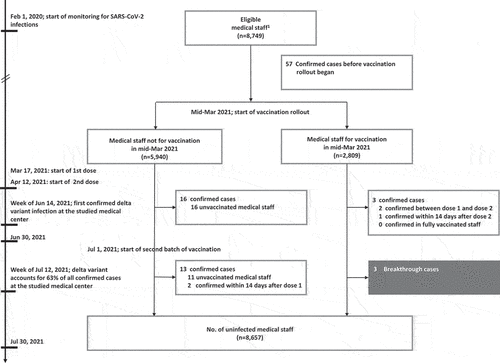ABSTRACT
Evidence of BNT126b2 vaccine effectiveness and breakthrough has been primarily demonstrated in populations outside of Asia; studies in the Western Pacific region are limited. Our retrospective cohort study assessed SARS-CoV-2 cases after vaccine rollout starting from mid-March 2021 at a tertiary hospital in Tokyo. Of 8,749 staff members, no fully vaccinated staff demonstrated confirmed infection, versus 19 cases in unvaccinated or partially vaccinated staff, by the end of June. Three breakthrough cases were identified in July, correlating with spread of delta variant in Tokyo. While our findings confirm the effectiveness of BNT162b2 vaccine in Asian populations, the presence of breakthrough cases despite strict infection control regulations suggest that ongoing public hygiene measures are required even after vaccination.
Dear Editor:
Vaccination against COVID-19 in the Western Pacific region has lagged behind some North American and European countries, where more than 60% of the population have currently received at least one dose of vaccine.Citation1 The first large country to use mRNA vaccines for mass vaccination in the Western Pacific region, Japan approved BNT126b2 vaccine on Feb 14, 2021 with medical staff receiving priority vaccination.
Evidence on BNT126b2 vaccine effectiveness has been primarily generated in populations outside of Asia; reports from the Western Pacific remain scant. As our recent report of substantially higher rates of adverse reactions in Japanese populations after second dose of BNT162b2 suggests that vaccine dynamics differ by ethnicity, we conducted a retrospective cohort study at our hospital to confirm vaccine effectiveness (Juntendo University IRB; No. 2021055).Citation2
At our hospital, masks are universally required in all facilities except while eating. Outside work hours, dining with more than three non-family members is actively discouraged per hospital policy. Temperature checks occur daily at the workplace, with symptoms suspicious for COVID-19 undergoing further examination. Close contacts of confirmed cases are PCR-tested and quarantined.
Relevant infectious disease data were extracted from the electronic chart of all hospital employees, university faculty, students and administrative staff (medical staff) at Juntendo University Hospital between Feb 1, 2020 and Jul 30, 2021. 8,749 medical staff (mean age [SD]; 37.1 [±14.9]; 49.7% women; 77.8% aged under 50) were included in this cohort study. Due to a shortage of BNT162b2 vaccines at the time of rollout, as well as according to the wishes of medical staff to receive vaccination, 2,809 frontline medical staff ultimately received vaccination. Administration of BNT126b2 vaccine doses 1 and 2 started on Mar 17, 2021 and April 12, 2021, respectively. Since the start of vaccination, a total of 19 cases were identified by the end of June, of which 16 occurred in unvaccinated medical staff, 3 in partially vaccinated staff, and 0 in fully vaccinated staff. ().
Figure 1. Confirmed cases before and after vaccination.

As the delta variant spread in the Tokyo metropolitan area began in early June, we continued case monitoring, finding an additional three cases in fully vaccinated medical staff in July, all with the delta variant. After receiving vaccines in March and April, these three staff confirmed seropositivity for anti-spike antibodies in June, at 417, 447 and 1,476 U/ml, respectively. For medical staff who didn’t receive vaccines in March and April, vaccination using BNT162b vaccines started from July 1. We confirmed additional 13 cases from those staff in July, of which 11 unvaccinated and 2 partially vaccinated, with mixed alpha and delta variants. ().
We confirm real world effectiveness of BNT162b2 vaccines in the adult Japanese population, consistent with findings from other non-Asian countries.Citation3,Citation4 Nonetheless, breakthrough cases with highly transmissible variants, even in institutions with strict safety and hygiene protocols, suggest that appropriate measures will continue to be required even after vaccination.
Ethical statement
This study was approved by the Institutional Review Board of Juntendo University Faculty of Medicine, Juntendo University with No. 2021055.
Disclosure statement
The authors declare no conflicts of interests.
Additional information
Funding
References
- Our World in Data. [accessed 2021 Aug 27]. https://ourworldindata.org/covid-vaccinations.
- Saita M, Yan Y, Ito K, Sasano H, Seyama K, Naito T. Reactogenicity following two doses of the BNT162b2 mRNA COVID-19 vaccine: real-world evidence from healthcare workers in Japan. J Infect Chemother. 2021 Sep 16;S1341–321X(21):00258-0. Online ahead of print.
- Angel Y, Spitzer A, Henig O, Saiag E, Sprecher E, Padova H, Ben-Ami R. Association between vaccination with BNT162b2 and incidence of symptomatic and asymptomatic SARS-CoV-2 infections among health care workers. JAMA. 2021 Jun 22;325(24):2457–65. doi:10.1001/jama.2021.7152.
- Gohil SK, Olenslager K, Quan KA, Dastur CK, Afsar N, Chang W, Huang SS. Asymptomatic and symptomatic COVID-19 infections among health care personnel before and after vaccination. JAMA Netw Open. 2021 Jul 1;4(7):e2115980. doi:10.1001/jamanetworkopen.2021.15980.
